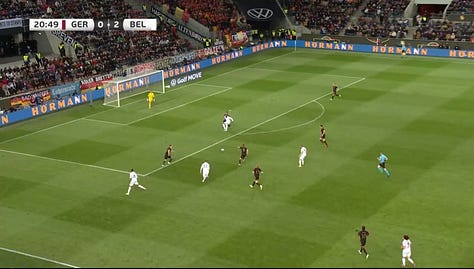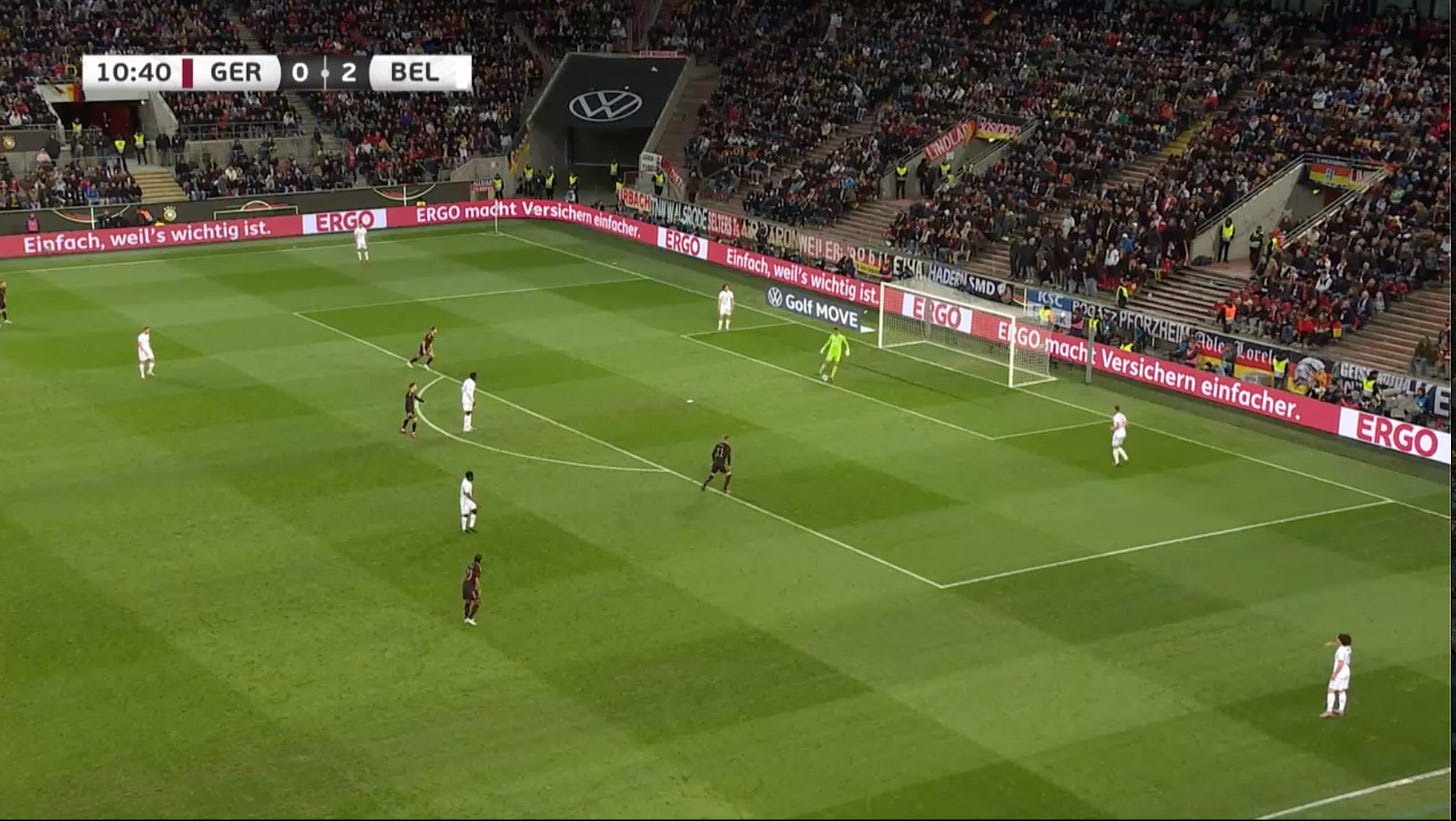What went Wrong for Hansi Flick's Germany Against Belgium?
After victory over Peru, Germany came crashing down to earth again with defeat to Belgium. The one goal-margin flattered Hansi Flick’s outfit who were outclassed and outfought. What went wrong?
After a convincing 2:0 victory over Peru on Saturday, Germany came crashing down to earth again with defeat to Belgium. The one goal-margin flattered Hansi Flick’s outfit who were outclassed and outfought for almost all of the fixture.
Particularly the first 30-odd minutes were a disaster, with Domenico Tedesco’s side over-running the German outfit to take a 2:0 lead that could have easily been 3 or 4.
In today’s article, we look at what went wrong for Germany in their first big test since the World Cup, paying particular attention to the first 30 minutes of utter Belgian domination.
A lot of the issues both started and ended with Germany’s defensive structure. While on paper Flick set up in a 4-2-2-2, out-of-possession Germany would push an aggressive number of players into the final third to provoke a turnover high in the opponent’s half.

It’s a systemic ploy that mirrors much of what Julian Nagelsmann did at FC Bayern this season, but how it was executed on Tuesday night was far from satisfactory. Despite committing up to 7 players in the pressing sequence, Belgium regularly found ways to alleviate the tension and break Germany’s first defensive line.
There are a number of reasons for this…
The Central Midfield Structure
Hansi Flick opted for the preferred pairing of Leon Goretzka and Joshua Kimmich for this fixture. Since 2018 the duo has been playing club football together for FC Bayern, and in the past 3 seasons, they’ve been the undisputed starting pairing for both club and country.
However, despite their vast individual qualities, what became evident again tonight was how neither truly possesses the combative defensive qualities to clean up in central zones when possession is turned over, or a high press is broken.
With both players' skill sets primarily translating to that of a roaming box-to-box 8, the clear reserved midfielder was missing for large stretches of Belgium’s early dominance. With both players struggling to win all-important 1v1 duels, and regularly committing themselves to the initial line of pressure, Belgium were regularly able to dance through the central spaces which Amadou Onana and Kevin de Bruyne dominated.
Only with the introduction of Emre Can for Leon Goretzka (minute 32) did things begin to shift back into equilibrium. The 29-year-old performed with the same maturity with which he has done for BVB all year. He provided a backbone of structure with a simple game in possession, and dominance and conviction in his actions against the ball. In his 38th national team appearance, Can was a bright spot in an otherwise dim display, completing 95% of his passes, and winning 7 of 7 defensive duels.

Not only was Can a top performer, but his introduction had a knock-on effect on Joshua Kimmich. The Bayern midfielder was then allowed to play slightly higher up the pitch, pressing with more freedom, and getting on the ball in positions where he could provide more of a direct attacking impact.
A Chain-Reaction
It wasn’t just an extra midfielder committing to the first line of pressure, but Hansi Flick regularly asked one - or even both - his fullbacks to push into Belgium’s final third to win back the ball.
Domenico Tedesco, a wise tactician in his own right, countered this ploy by building up with an extremely deep back-4 (see below).
This forced Germany’s wingbacks into a tough decision. Do I leave myself exposed by stepping into the final third to improve the first line of pressure, or do I stay in my position, allowing Belgium to build out of the back more easily, and possibly exploit our numerical disadvantages in central positions?
On the right, Marius Wolf was often left in between the two. The Dortmund fullback neither committed himself fully to prevent the build-up, nor dropped off to play man-for-man against Belgium’s lively left winger, Yannick Carrasco.
This decision (or rather in-decision) forced Kimmich to cover even more ground against the ball, dragging himself into wide spaces that further loosened Germany’s central stronghold.
Marius Wolf can’t decide between holding his position or pressing the ball carrier. This forces Kimmich out of position and gives Carrasco a great opportunity to expose Germany’s wide-open midfield.
For David Raum, it was often the first option: stepping all the way up the pitch to provide direct opposition to Timothy Castagne.
Occasionally, the Leipzig left-back was able to force a turnover, but more often than not, his high positioning left Germany hopelessly exposed.
A smart diagonal to the now-free Dodi Lukebakio was one option that Belgium could take, but even more dangerous was the immediate press-breaking ball in the direction of Romelu Lukaku.
Standing at 193 centimeters and weighing more than 100 kg, Lukaku is a center-forward built for holding up possession and providing a direct solution against a high-pressing outfit. Hansi Flick’s lack of oversight to counter the strengths of Belgium’s record goalscorer was arguably the biggest error of the night.
Had Germany been playing against Spain or Italy - two nations without an elite physical forward capable of holding up possession - Hansi Flick’s high-pressing system may have borne fruit. Germany could have felt comfortable taking the risk of creating 1v1 situations in defense, if it meant adding an additional two defenders to the first line of pressure.
However, against the threat of Lukaku, Flick should have never come to this conclusion. With one of Matthias Ginter or Thilo Kehrer constantly forced to cover for an expansive fullback or rogue-moving midfielder, Lukaku was able to force 1v1 duels against Germany’s last line of defence. This was largely how Belgium came to score their first goal on the night, and also how The Red Devils created countless other high-quality opportunities in the first half hour.



It took almost 35 minutes before Flick finally addressed the issue with a double-change and a switch to a 4-2-3-1. Belgium now had more time to make decisions in the build-up phase, but Germany had more lines of defensive pressure, and could secure Lukaku with two centre backs, and an additional defensive-minded midfielder.

Furthermore, for the fullbacks the game also became simpler. The introduction of wingers meant they were no longer forced to come to a difficult decision in pressing phases, while in possession, they no longer represented the only form of width in the final third.
Leadership Personalities
Joshua Kimmich is Hansi Flick’s captain.
Though his form has been spotty & inconsistent this season, the midfielder is one of the most reliable elements of the side, seems to have a good relationship with all sectors of the squad, and has an impressive injury track record to ensure that he is always available to be on the pitch.
One thing he struggles with, however, is providing a vocal instructive presence. Particularly in organizing Germany’s press, a presence like Thomas Müller is sorely missed.
The 33-year-old’s time in the national team is slowly coming to an end, but even more than his elite qualities, his coordinating presence will be what Hansi Flick finds hardest to replace.
No player in Germany’s attack looks ready to take up this all-important role, and neither Joshua Kimmich nor Leon Goretzka seemed capable of doing so from a deeper position.
Furthermore, until the introduction of Emre Can, Germany also lacked an individual capable of calming the game in key moments and bringing a reassured presence to the game in possession.
Both Goretzka and Kimmich are often extremely direct in their passing. For FC Bayern, this often allows them to exploit disorganized opposition, and capitalize on sides stuck in transition.
However, for the national team where there is less time on the training pitch, these traits often result in careless giveaways.
In matches where Germany dominates possession, this assertive and vertical outlook isn’t necessarily a bad trait to have, but in fixtures like Tuesday’s - where Flick’s side spent large periods of the opening 30 minutes expending energy and chasing possession - having a more authoritative and calming presence is something which both Bayern midfielders must develop in their game.
Without a foothold in the game, and having conceded two goals within 10 minutes, Germany were likely looking towards their captain to calm the game and provide a reassuring presence. Instead, Kimmich only added to the hectic nature by attempting extremely ambitious passes that were unlikely to ever reach their target.
For the first time since 1954, Germany have lost to Belgium in an international fixture. More than the result, however, is the reality that many of the issues which plagued the side at the World Cup have only grown larger in the interim period.
The defense is error-prone, and uncoordinated, while the attack continues to function as individual units, rather than a team fit for success.


While it’s easy to chalk the Belgium fixture off as a meaningless friendly, the looming fact remains that Germany have less than 16 months to go before hosting the European Championships, and this squad looks further and further from a functioning outfit with each passing game.





Hoping BVB could end Bayern’s dominance in the league, thus pave the way for Hansi Flick overhaul the national team calling upon Schwargelben stars, the ever renowned Emre Can.